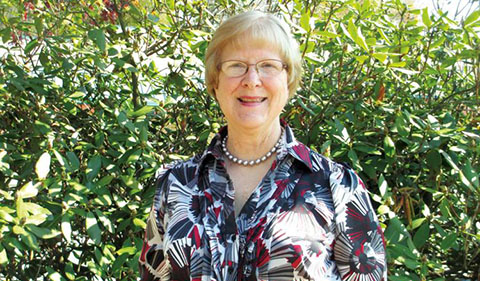
Jan Rienerth, Photo credit: Yogi Collins
by Aissatou Boye ’20
Janice Rienerth attended and graduated from the College of Arts and Sciences Ohio University in the 1960s, with a B.S. in Math and a B.A. in Sociology. After graduation, she worked a year before accepting an assistantship in Sociology at Southern Illinois University, where she earned her Master’s and Doctorate in Sociology. While Rienerth was completing her dissertation, she accepted a tenure track position at Appalachian State University, where she became the first woman in their sociology department.
She describes her time attending OHIO as a time of great social change and personal awakening. She was exposed to areas of study she had never heard about in high school, including sociology. She also remembers more than one major flooding of the Hocking, the reaction to the Cuban Missile Crisis and the assassination of a president.
It is evident through her accomplishments how her undergrad experiences helped to shape her future.
Pursuing a Career in Sociology
Rienerth’s experiences epitomize the meaning of a sociologist.
She used the events and changes in the world around her to guide her in her professional journey.
“This was a period of great social change, including feelings and laws that related to women,” she says. “I think this issue allowed me to continue to move forward on the career path of college teaching. I also found out that I enjoyed learning new things and sharing that knowledge with others. All of this is to say that my career choice was based more on chance (changes occurring during the 1960’s) than choice.”
Rienerth states that the life of an academic consists of three things – teaching, research, and service. At Appalachian State University, she taught a variety of classes, as well as progressing through academic ranks for 40 years. She also developed and directed the internship program in Sociology there.
“It is often difficult for students to see how their degree applied to the “real world,” she said.
So she created both a departmental internship program and a class to prepare students for their internships. Over the 30 years that she ran this program she enjoyed watching students grow from a sense of insecurity about how to use their degree to successful adults and employees.
Rienerth also served as sorority advisor for Sigma Kappa, helping students deal with academic and personal issues.
Service Within her Community
She was also quite involved in service work by extensively helping out her community using her sociological knowledge.
Her service work includes working with youth who became part of the juvenile justice system, due to abuse, dependency or neglect. She also, along with a few others, created the Watauga Youth Network. This network, has expanded to become the Western Youth Network, has mentoring programs, teaches drug education, and even runs a summer program to help increase the children’s social skills and recreational experiences. It has now existed for over 30 years helping many youths get back on track.
In addition to this Network, Rienerth also volunteers with the Guardian ad Litem program which trains adults to do independent investigations for abused, neglected and dependent children in the juvenile court system.
“Over the 30 years I have been a volunteer, I have investigated children who have had a variety of negative and traumatic experiences,” she adds. “Using my sociological background, I helped these children get the services they needed and acted as their ‘voice in court.’”
Rienerth has an inspirational résumé helping people in so many different ways. From her work in academia, service work, and even personally, she has touched so many lives.
What’s Reinerth up to now?
Rienerth is now retired; however, that has not stopped her from continuing to help others.
She is still a Guardian ad Litem and a sorority advisor, as well as becoming a member of the local Women’s Fund.
She has served as a committee chair and three years as the Women’s Fund Board chair. Their program raises money to provide grants to programs in the High Country that provide services to women and children. Last year they gave away approximately $106,000.
Furthermore, she became involved the local health department’s Innovative Alternatives grant is designed to develop programs and services to help children and youth with diverse abilities. These children may be on the autism spectrum, have cerebral palsy, diabetes or blindness etc. They often have difficulty finishing school, finding suitable employment and/or going on to be productive citizens and live independently.
As a member of the Transitions and Healthcare subcommittee, Rienerth works primarily to develop and help support programs that ease the transition of these youth from students to employment. As far as living independently, they are supporting the idea of a village of tiny homes where these young people could live in a supportive community environment.
Her interests also include visiting assisted living facilities, making crafts for the local Humane Society to sell to support their spay/neuter program, and traveling.
More on Her OHIO Experience
Through all the different things she has and continues to do, she credits much of her personal and professional direction to her undergraduate experience here at OHIO.
“In conclusion, my education in Sociology at OHIO fueled my interest in working to make my community a better place to live and work,” she says.
“Whether by helping college students learn how to apply their degree to developing programs to help abused, neglected and dependent children, I have lived by the motto I once read – that I want to do as much as I can, for as many people as I can, for as long as I can.”



















Comments